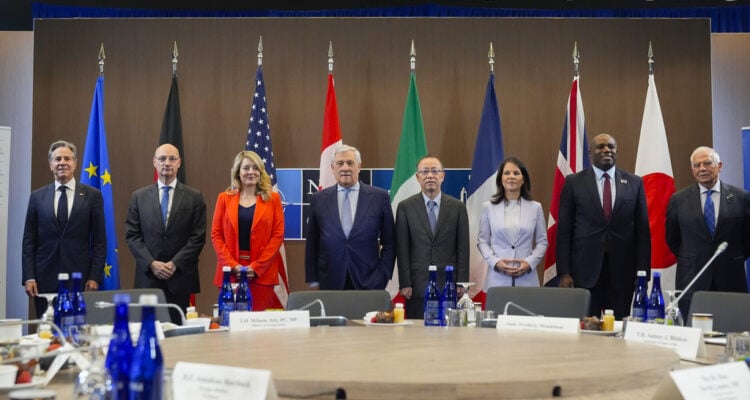An Iranian attack on Israel is expected as early as Monday.
By Batya Jerenberg, World Israel News
The G7 countries expressed their worry over an escalation of violence in the region Sunday after the U.S. said that Iran could attack Israel as early as Monday.
The foreign ministers of Canada, France, Germany, Italy, Japan, the UK and EU put out a joint statement saying, “We express our deep concern over the heightened level of tension in the Middle East which threatens to ignite a broader conflict in the region.”
“We urge all involved parties to refrain from perpetuating the current destructive cycle of retaliatory violence, to lower tensions and engage constructively towards de-escalation. No country or nation stands to gain from further escalation in the Middle East,” America’s closest allies added.
Their statement followed a conference call with U.S. Secretary of State Antony Blinken, who had urged them to increase their diplomatic pressure on Tehran and its chief proxy, Hezbollah, to minimize an expected retaliatory strike on the Jewish state.
An IDF airstrike took out Hezbollah chief Hassan Nasrallah’s military chief-of-staff, Fuad Shukr, in Beirut last Tuesday.
Less than a day later, a bomb reportedly planted by Iranian agents working for Israel exploded in the bedroom where Hamas leader Ismail Haniyeh was sleeping in Tehran following the inauguration of Iran’s new president, killing him as well.
Israel has not taken formal responsibility for Haniyeh’s death, but Iran, deeply embarrassed by the assassination in its own capital, immediately blamed Jerusalem and said it had to retaliate to salvage its honor.
The mullahs have so far rejected all calls for restraint, even going so far as to say it “didn’t care if it triggered war.”
It is assumed that it will try a massive missile attack like it did in mid-April, in response to the IDF assassination of the leader of the Islamic Republic’s Revolutionary Guards.
This is not necessarily the case, however, as the mullahs have been more cagey this time as to how its revenge will be carried out and what will be its targets. It could also try to attack Israeli or Jewish sites abroad, as it has done in the past.
On April 13, Iran launched over 300 missiles at Israel at once, including cruise missiles, but almost every one was intercepted by Israeli, American, British, French and even Arab forces such as Jordan, Egypt, and the UAE.
The only “success” Iran could point to was one projectile doing some damage to an Israeli military base, and one Bedouin child being seriously injured by falling shrapnel, who was recently released from the hospital.
Hezbollah has said it will go for civilian targets, and deeper in Israel than it has gone before, pretending as if its over 6,700 rockets and anti-tank missiles launched over the Lebanese border since October 8 in support of Hamas have solely been aimed at military sites.
Hundreds of homes and businesses in Israel’s north have been damaged if not destroyed by Hezbollah projectiles, and more than two dozen civilians have been killed. Twelve of them were children playing on a soccer field in Majdal Shams nine days ago, an attack Israel said was masterminded by Shukr, leading to his assassination.





